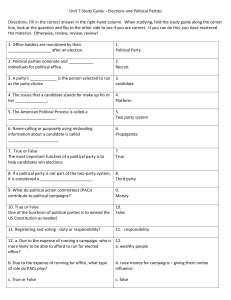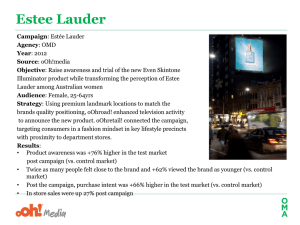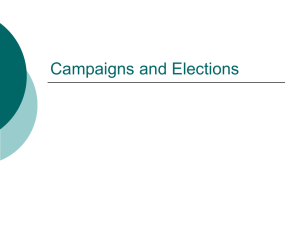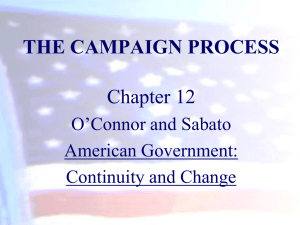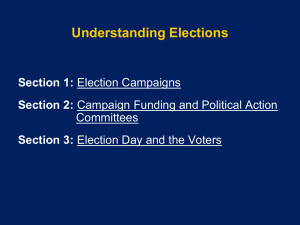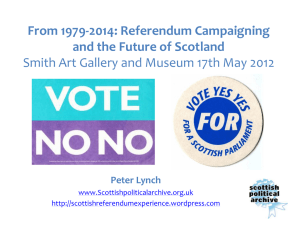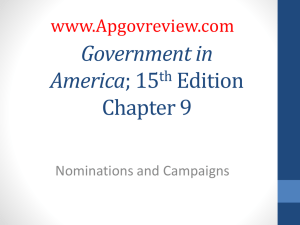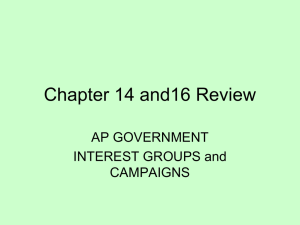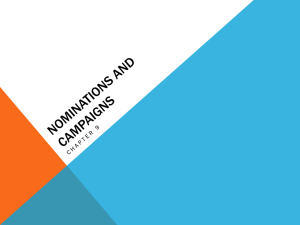APGOV Power Point 14 - Long Branch Public Schools
advertisement
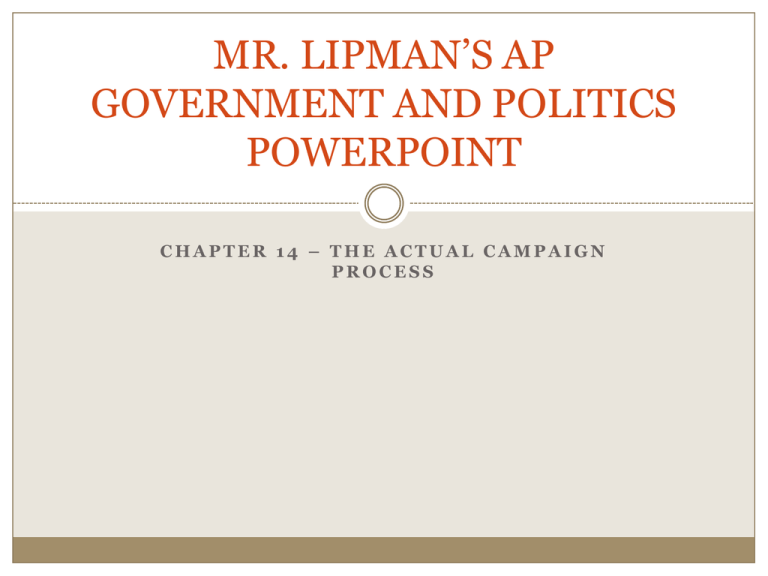
MR. LIPMAN’S AP
GOVERNMENT AND POLITICS
POWERPOINT
CHAPTER 14 – THE ACTUAL CAMPAIGN
PROCESS
Party leaders are concerned with electability
Party activists are concerned with ideology and
issues.
The successful candidate must appeal to both
Most electoral contests are
similar in structure.
Nomination campaign aimed
at winning primary.
{Run to 1st base}
General election campaign
aimed at winning final race.
{Run to 2nd base/middle of the
field}
Who do candidates typically appeal to during a
general election campaign?
A.Party activists
B.Members of all parties
C.Members of the political elite
D.The conservatives within the party
E.The ideological center of the party
Who do candidates typically appeal to during a
general election campaign?
A.Party activists
B.Members of all parties
C.Members of the political elite
D.The conservatives within the party
E.The ideological center of the party
GOAL IS TO REACH THE VOTER
Voter Canvas: Process of reaching individual
voter
Paid Media
Free Media
Inoculation Ad (“stop damage before it hits”)
Spinning
More Bang for the Buck (“sorry Ike”)
Assembling a Campaign Staff
A candidate, volunteers, campaign consultants,
and a paid staff make up the campaign.
Volunteers focus on canvassing and getting out the
vote.
The paid staff consists of
campaign manager;
finance chair;
communications staff;
press secretary.
While candidates running for presidential, senatorial,
or gubernatorial offices have paid staff those running
for state offices rely heavily on
state campaign agencies.
community funded campaign workers.
state political parties.
volunteers.
the national parties.
While candidates running for presidential, senatorial,
or gubernatorial offices have paid staff those running
for state offices rely heavily on
state campaign agencies.
community funded campaign workers.
state political parties.
volunteers.
the national parties.
Raising Money
Congress has long limited campaign contributions:
1907 Tillman prohibits corporations from making direct
contributions to federal campaigns
The Corrupt Practices Act, Hatch Act, Taft-Hartley Act; The
Federal Election Campaign Act
Bipartisan Campaign Reform Act (BCRA)
Citizens United v. FEC, 2010
To Learning Objectives
CAMPAIGN FIANCING LAWS
Federal Election Campaign Act (FECA) governs
McCain-Feingold (2002): Upheld 5-4 by Supreme
Court. Goal is not fairness but to limit single outside
influences which can lead to corruption.
{opposition says violates free speech rights}
Political Action Committee (PAC): Officially
registered fund raising committee and usually favor
incumbents but the trend is changing. Most elected
officials have set up their own.
_____ are donations from general tax
revenues to the campaigns of qualifying
presidential candidates.
A. Matching funds
B. Public funds
C. PACs
D. Member PACS
E. Personal savings
_____ are donations from general tax
revenues to the campaigns of qualifying
presidential candidates.
A. Matching funds
B. Public funds
C. PACs
D. Member PACS
E. Personal savings
FINANCING CONTINUED
Incumbents can use their PACS to help fellow
candidates or office holders (“think Hillary”)
Buckley v. Valeo (1976) : Supreme Ct. says no limit
can be placed on $ candidate spends from his own
family funds.
Public Funding: As of now only for Presidential
Candidates, and in some states, {“matching funds”}
but what does the future hold.
FINANCING CONTINUED
Hard Money = clearly regulated, specific and
limited
Soft Money = unregulated, unlimited, and
usually raised by PACs and Individuals
Express Advocacy Ads: Intended to influence
election and thus can only be bought with hard
money
Issue Advocacy Ads: May be paid with soft $
_________ ad compare the records and
proposals of the candidates, showing the
candidate sponsoring the ad in a more favorable
light.
A. Positive
B. Negative
C. Contrast
D. Inoculation
E. Fear
_________ ad compare the records and
proposals of the candidates, showing the
candidate sponsoring the ad in a more favorable
light.
A. Positive
B. Negative
C. Contrast
D. Inoculation
E. Fear
Campaign Advertisements
Positive ad
Negative ad
Contrast ad
Inoculation ad
Fear ad
JUST FOLLOW THE $
527 political committees: Unregulated interest
groups focused on specific issue (used to avoid limits
on PACs)
6% of PACs spent 62% of all money on congressional
election races in 2001-02
campaigns……………………..but
Internet and Obama appear to have changed
everything when it comes to raising money
What are the individual contribution limits
under BCRA?
How do PACs allocate their campaign
contributions?
Back
To Learning Objectives
Obama’s win in 2008 was the largest
Democratic win since _______.
1976
1964
1992
1932
1912
Obama’s win in 2008 was the largest
Democratic win since _______.
1976
1964
1992
1932
1912
Campaign Financing
http://www.melissadata.com/lookups/fec.asp
Use the above site to see who has given money to
federal election campaigns in a given year and zip
code.
